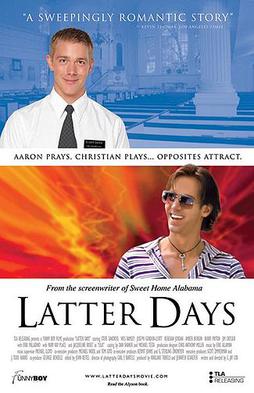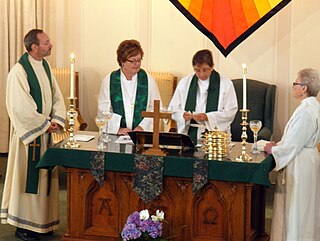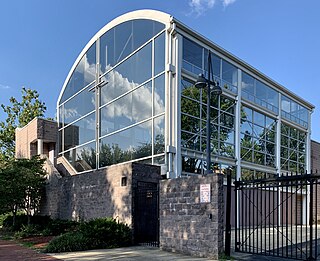
The Metropolitan Community Church (MCC), also known as the Universal Fellowship of Metropolitan Community Churches (UFMCC), is an international LGBT-affirming mainline Protestant Christian denomination. There are 222 member congregations in 37 countries, and the fellowship has a specific outreach to members of the LGBT community.

Latter Days is a 2003 American romantic comedy-drama film about a gay relationship between a closeted Mormon missionary and his openly gay neighbor. The film was written and directed by C. Jay Cox and stars Steve Sandvoss as the missionary, Aaron, and Wes Ramsey as the neighbor, Christian. Joseph Gordon-Levitt appears as Elder Ryder, and Rebekah Johnson as Julie Taylor. Mary Kay Place, Khary Payton, Erik Palladino, Amber Benson, and Jacqueline Bisset have supporting roles.

Troy Deroy Perry Jr is an American cleric and the founder of the Metropolitan Community Church, with a ministry with the lesbian, gay, bisexual, and transgender communities, in Los Angeles on October 6, 1968.

Nancy L. Wilson is an American cleric who served as the moderator of the Universal Fellowship of Metropolitan Community Churches. Under Wilson's leadership, the denomination became known as "The Human Rights Church" in many parts of the world for its commitment to same-sex marriage, employment and housing non-discrimination laws.
Metropolitan Community Church London was the first Metropolitan Community Church congregation in Europe and the first one chartered out of the United States. The congregation was founded in 1972 as the Fellowship of Christ Liberator and at least a year later a majority indicated that they wished to affiliate with the MCC. The then minister, the Revd Tony Cross, resigned and Peter Embrey did not wish to continue to host the congregation. The name was changed and they went on to occupy a location on Sistova Road, in the Balham neighbourhood of South London. MCC London no longer exists as a congregation, but was the source of three other congregations: MCC North London, MCC East London, and MCC South London. MCC churches have a "primary ministry in gay, lesbian, bisexual, transgender and queer communities, providing a safe-space environment of an accepting congregation where people can find God's salvation, personal support, spiritual growth and guidance toward health and wholeness." The churches have been active in efforts to support marriage for LGBTQ people and specifically reach out to LGBTQ families. They have also supported efforts to educate and combat violence against LGBTQ people.
Chris Glaser has been an activist in the movement for full inclusion of LGBT Christians in the Presbyterian Church (U.S.A.), or PCUSA, for over 30 years. He is currently a minister in the Metropolitan Community Church, or MCC.
Cynthia Love is an American human rights advocate, executive, author, public speaker,entrepreneur and businessperson. She is former executive of publicly traded TORO, academic administrator, and retired ordained minister who started eight companies, several non profits and served for four years as the Executive Director of the Metropolitan Community Church and three years as ED of Soulforce
Darlene Onita Garner is an American minister and LGBT activist, and a co-founder of the National Coalition of Black Lesbians and Gays (NCBLG). She was the first African-American elder in the Metropolitan Community Church and she helped create the denomination's biannual Conference for People of African Descent (PAD). In 2008 and 2009, she served as MCC Vice-Moderator. She is a nationally recognized speaker on LGBT religious issues; for instance, she was invited to join several other nationally known speakers to announce the "American Prayer Hour", a gay-affirming alternative to the "National Prayer Breakfast". For her work in the LGBT community, Garner was credited in The African American Almanac as "contributing to the visible image of gays in society" and in 2010 was named a "Capital Pride Hero" by Capital Pride.
Marsha Stevens-Pino is an American Christian singer, musician, songwriter and recording artist.
This is a list of notable events in the history of LGBT rights that took place in the 1970s.

Save Our Children, Inc. was an American political coalition formed in 1977 in Miami, Florida, to overturn a recently legislated county ordinance that banned discrimination in areas of housing, employment, and public accommodation based on sexual orientation. The coalition was publicly headed by celebrity singer Anita Bryant, who claimed the ordinance discriminated against her right to teach her children biblical morality because the ordinance specifically required parochial Christian schools, like the one her children attended, to hire openly homosexual teachers. It was a well-organized campaign that initiated a bitter political fight between gay activists and Christian fundamentalists. When the repeal of the ordinance went to a vote, it attracted the largest response of any special election in Dade County's history, passing by a more than 2-to-1 margin. In response to this vote, a group of gay and lesbian community members formed Pride South Florida, now known as Pride Fort Lauderdale, an organization whose mission was to fight for the rights of the gay and lesbian community in South Florida.
Many views are held or have been expressed by religious organisation in relation to same-sex marriage. Arguments both in favor of and in opposition to same-sex marriage are often made on religious grounds and/or formulated in terms of religious doctrine. Although many of the world's religions are opposed to same-sex marriage, the number of religious denominations that are conducting same-sex marriages have been increasing since 2010. Religious views on same-sex marriage are closely related to religious views on homosexuality.
The ordination of lesbian, gay, bisexual and/or transgender (LGBT) clergy who are open about their sexuality or gender identity; are sexually active if lesbian, gay, or bisexual; or are in committed same-sex relationships is a debated practice within some contemporary Christian denominations.
Kittredge Cherry is an American author and a priest of Metropolitan Community Church.
The Patch was an LGBT bar formerly located at 610 W. Pacific Coast Highway in the Los Angeles neighborhood of Wilmington, California. The Patch, along with the Black Cat Tavern, played a pivotal role in the gay rights movement, when, in August 1968, it was one of the first sites where there was open resistance to the constant police harassment of gay establishments and meeting places in Southern California.
This article concerns LGBT history in Florida.
Richard Frank Adams was a Filipino-American gay rights activist. After his 1975 same-sex marriage was declared invalid for the purposes of granting his husband permanent residency, Adams filed the federal lawsuit Adams v. Howerton. This was the first lawsuit in America to seek recognition of a same-sex marriage by the federal government.
The following is a timeline of lesbian, gay, bisexual, and transgender (LGBT) history in the 20th century.

The Metropolitan Community Church of Washington, D.C. is a congregation of the Metropolitan Community Church (MCC), a Protestant Christian denomination catering to LGBT people, located in the Mount Vernon Square neighborhood of Washington, D.C. Founded in 1970 as the Community Church of Washington, D.C. (CCDC), the congregation led by Pastor Paul Breton joined the new MCC denomination in 1971 with help from local activist Frank Kameny.
This is a timeline of LGBT Mormon history in the 1970s, part of a series of timelines consisting of events, publications, and speeches about LGBTQ+ individuals, topics around sexual orientation and gender minorities, and the community of members of the Church of Jesus Christ of Latter-day Saints. Although the historical record is often scarce, evidence points to queer individuals having existed in the Mormon community since its beginnings. However, top LDS leaders only started regularly addressing queer topics in public in the late 1950s. Since 1970, the LDS Church has had at least one official publication or speech from a high-ranking leader referencing LGBT topics every year, and a greater number of LGBT Mormon and former Mormon individuals have received media coverage.





